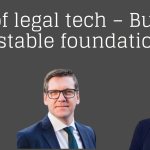Norton Rose Fulbright’s (NRF’s) legal technology innovation architect Ryan McClead has elevated expert systems software platform Neota Logic from a proof of concept phase to using its apps within the business, including into a potentially revenue generating compliance tool.
McClead, who worked as knowledge systems manager for Fulbright & Jaworksi before its merger with Norton Rose in June 2013, has for the last year and a half been developing relationships with start-ups and smaller technology companies with a view to taking advantage of the innovation springing up from that sector of the market.
By using the concept of ‘sand box, tool box and window box’ McClead and his team have been working with Neota and other companies such as Kira Systems on a trial basis.
McClead said: “Keeping up with legal technology is impossible, you could have 20 people working on it and still not keep up. So my response is to put everything in the sand box and try to understand what it is capable of and where it can go. “They’re all software-as-a-service products and that gives the firm the opportunity to play with them and see if they have a particular use case or many use case.”
Neota is in the tool box, which means NRF is now licensed to use Neota’s applications and over the last few weeks has been looking at different use cases within the business. McClead is in the process of building a client guide to compliance legislation, built on a microsite in HighQ’s Publisher tool and with 8 small Neota apps built into it to help determine different aspects of compliance.
While it is still early days and McClead has yet to formalise how else NRF will use Neota’s apps, the firm, particularly in London and South Africa, is looking at more document and process automation as well as new kinds of interactive tools for clients. Kira Systems meanwhile, is almost ready to move into the tool box according to McClead.
McClead said: “Where a practice area or partner come to me with a problem, my team can build a prototype using a bit of this and a bit of that. It’s different to the traditional approach of ‘we’ll go away for two years and come back with a quarter of what you want.’ It’s usually days at most and we’ll come back and get feedback. It becomes an iterative process.”
He adds: “[The tool box] doesn’t allow us to stay on top of everything but if there are tools in the tool box that are not keeping up we can replace them or leverage our relationship to say ‘there are other tools that can do this, how long will it take to make your product do what it can do?’”
This article first appeared in the latest Legal IT Insider
Read Ryan McClead writing for 3 Geeks and a Law Blog on the Napsterisation of legal services








